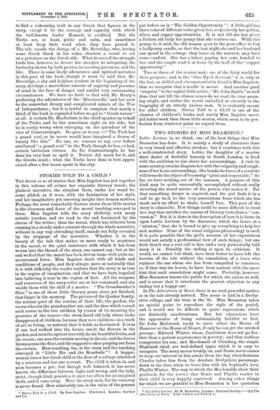STORIES TOLD TO A CHILD.*
Tun dozen or so of stories that Miss Ingelow has put together in this volume all evince her exquisite literary touch ; the plainest narrative, the simplest facts, under her wand be- come gilded, as it were, with the fascination of her style, and her imaginative yet unerring insight into human motives. Perhaps the most remarkable feature about these little stories is the clearness and force of the moral teaching conveyed in them. Miss Ingelow tells the story skilfully, with many artistic touches, and we read to the end fascinated by the charm of the writer; then the moral, which has hitherto been running in a steady under-current through the whole narrative, without in any way obtruding itself, stands out fully revealed by the stoppage of the narrative. Whether it is the beauty of the tale that makes us more ready to acquiesce in the moral, or the quiet insistence with which it has been woven into the thread of the story, one cannot say; but at the end we feel that the moral has been driven home with quite un- accustomed force. Miss Ingelow deals with all kinds and conditions of people, and they always move so naturally that it is with difficulty the reader realises that the story is so true in the region of imagination, and that we have been beguiled into believing it true in the region of fact. All the weapons and resources of the story-teller are at her command, and she wields them with the skill of a master. "The Grandmother's Shoe" is one of those little literary gems, clear, yet finished, that linger in the memory. The picture of the Quaker family, the solemn quiet of the routine of their life, the garden, the recess wherein the grandmother sat, and the shoe which caused such terror to the two children by reason of its meaning the presence of the wearer—the stern-faced old lady whose looks disapproved of children, because they were children—is a work of art so living, so natural, that it holds ns fascinated. It is as if one had walked into the house, smelt the flowers in the garden, and seen the apricot tree with its six beautiful fruits, and the recess ; one sees the curtain moving in the air, and the leaves blown across the floor, and the suggestive shoe peeping out from the curtain. How touching, too, is the story and the teaching conveyed in " Little Rie and the Rosebuds " ! A beggar- woman leaves her hired child at the door of a cottage inhabited by a mistress and her one servant. The child is taken in, and soon becomes a pet ; but though well behaved, it has never known the difference between right and wrong, and the lady, strict, though kind, punishes it once too often for an imagined theft, and it runs away. Here the story ends, for the runaway is never found. How admirably, too, is the value of the present • Stories Told to a Child. By Jean Ingelow. Illustrated. London: Gardner and Co.
put before us in " The Golden Opportunity "! A little girl has three coins of different value given her, respectively her golden, silver, and copper opportunities. It is not till she has given a forlorn old body her penny that she realises one. With this penny, be it said, the old woman goes to the post-office to buy a halfpenny candle, so that the last night she and her husband can spend in the cottage they leave on the morrow, may have some comfort. She has a letter, paying her rent, handed to her, and the couple read it at home by the half of the " copper opportunity."
Two or three of the stories make use of the fairy world for their purpose ; and in the " One-Eyed Servant," it is only at the last, so skilful and circumstantial in detail is Miss Ingelow, that we recognise that a needle is meant. And another good "surprise " is the capital little satire, "Mr. John Smith," so well done that not till the climax comes do we read the true mean- ing aright, and realise the moral embodied so cleverly in the biography of an utterly useless man. It is evidently meant for older children. Stories Told to a Child is one of the classics of children's books, and surely Miss Ingelow never did better work than these little stories, which seem to be per- fection from whatever point we regard them.






















































 Previous page
Previous page